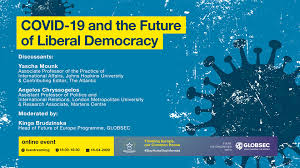A new call for UK to do more to stand up for democracy around around the world. More should be done by all democracies in solidarity with those fighting for their freedom. HT @Thieristan @timesredbox https://t.co/eTH4Z8y6Qi
— Mike Abramowitz (@abramowitz) July 29, 2020
The emergence of liberal democracies isn’t the inevitable endpoint of supposedly linear Western progress but an aberration—and a rather fragile one at that, argues Daniel Schwammenthal.
America today is what it has always been: a flawed society, like all others, but also a unique force for good in the world. No other multiethnic, multireligious society can credibly claim to be more democratic, more prosperous and more just than the U.S. But America can’t remain the leader of the free world if it is itself no longer free, he writes for The Wall Street Journal:
To be the guarantor of Western security requires military and economic power, but also a sense of mission. And right now Americans are committing mass character suicide. If the country goes beyond acknowledging that racism and inequality persist and must be fought, and instead convinces itself that it’s inherently and irredeemably racist, it can’t possibly continue to believe that it has any right to lead. Such an America would reject the notion that the West is worth defending and regard Europe as also inherently oppressive.
We know who will fill the vacuum left by an America in retreat and at war with itself, Schwammenthal adds. As they watch America’s self-immolation, leaders in Moscow, Beijing and Tehran surely can’t believe their luck.
 The liberal order faces its greatest crisis since the end of the Cold War, with liberalism in retreat around the world. The most striking failure of Western democracies is their inability — or unwillingness — to live up to the principles underpinning a liberal order, argues analyst Bobo Lo.
The liberal order faces its greatest crisis since the end of the Cold War, with liberalism in retreat around the world. The most striking failure of Western democracies is their inability — or unwillingness — to live up to the principles underpinning a liberal order, argues analyst Bobo Lo.
We are moving into a post-American era, but no one knows what this will look like. We are lost in transition, he writes in Global Order in the Shadow of the Coronavirus: China, Russia and the West, a paper for the Lowy Institute:
The result is a growing strategic, political, and normative void — a new world disorder.[13] This is characterised primarily by a lack of clarity (or agreement) about the rules of the international system. We are witnessing the steady de-universalisation of norms, as great powers and small states alike interpret laudable principles in self-serving ways. Meanwhile, those same great powers have rarely been less able to bend others to their will. For all the talk about models, either democratic or authoritarian, few countries are willing to be bound by them.
 The legitimacy of Western democracies rests ultimately on performance: ensuring personal and public security, decent living standards, and a healthy, safe environment for all. This entails a dual-track approach, Lo contends:
The legitimacy of Western democracies rests ultimately on performance: ensuring personal and public security, decent living standards, and a healthy, safe environment for all. This entails a dual-track approach, Lo contends:
- First, it means taking pride in liberal values, institutions, and achievements. This is no time for cultural cringe or undue modesty. As Steven Pinker notes, “globally, the resilience of democracy depends in part on its prestige in the community of nations”.[70] So when there is a good story to tell, it must be told. The blithe assumption in much of the West that liberal democracy is self-evidently superior to other forms of governance is unwarranted and self-defeating.
- Conversely, when non-democratic regimes perform better, or claim to do so, Western democracies must learn to compete. This applies across the board — to the management of public health crises; the dissemination of news and information; the upgrading of military, artificial intelligence (AI), and cyber capabilities; mobile communications; the development of green technologies; and boosting research and education.
The UK should do more to stand up for democracy around the world. Indeed, more should be done by all democracies in solidarity with those fighting for their freedom, says former ODI analyst Alex Thier (HT: Freedom House’s Mike Abramowitz @abramowitz above).
 Contrary to the naysayers, there is a future for liberalism in the twenty-first century. But to achieve this, we need to recognise a number of realities, Lo insists:
Contrary to the naysayers, there is a future for liberalism in the twenty-first century. But to achieve this, we need to recognise a number of realities, Lo insists:
- First, the values, norms and institutions of liberalism are in crisis. Many Western policymakers and thinkers remain in denial. They appear to believe that with some adjustments — a change of US president, more transatlantic unity, getting tough on China, and perhaps an accommodation with Russia — ‘normal’ service can be restored. Yet the problems of the liberal order run far deeper than these hopeful prognoses suggest.
- Second, despite vociferous claims to the contrary, Beijing and Moscow are not engaged in a multi-dimensional plot to undermine the global order. Such scapegoating diverts attention, often purposely, from repeated Western failures of commission and omission. Chinese and Russian actions have at times been disruptive and destabilising. But they scarcely amount to a conscious or coordinated strategy to build a new, authoritarian world.
- Third, the crisis of the liberal rules-based order has been largely self-inflicted, an exercise in ‘suicidal statecraft’[7] sustained over the best part of two decades….. To blame external forces for these troubles is to confuse cause and effect. The real issue is a collective Western failure to live up to the principles of liberalism, a failure exacerbated by gross policy misjudgments and fraying transatlantic and European unity.
- Finally, a fundamental rethinking of global governance is well overdue. The future does not lie in the return to dominant US leadership, great power competition or accommodation, or the post-Cold War utopia of a geopolitics-free world. For these are all false gods. The way forward lies in a more inclusive and flexible order, driven by a common imperative in meeting universal challenges, such as climate change, pandemic disease, and global poverty. Such an enterprise will be contentious and chaotic. But there is no alternative if we are to build a future that benefits the mass of humanity. RTWT







